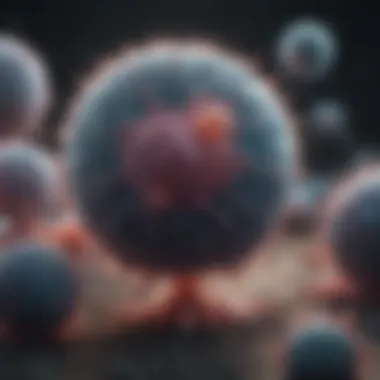Dr. Otto Heinrich Warburg: Unraveling Cancer's Roots


Intro
Dr. Otto Heinrich Warburg made significant contributions to the field of cancer research in the early 20th century. His work is foundational for understanding the metabolic changes that occur in cancer cells. Warburg proposed that the lack of oxygen experienced by cells, leading to a shift in their metabolic processes, is a central factor in the development of cancer. This hypothesis has sparked extensive discussion in scientific circles, influencing both past and contemporary research.
The relevance of Warburg's theories continues in modern studies, particularly as they relate to metabolic pathways in cancer cells. This article aims to explore Warburg's key ideas in detail, discussing their implications for cancer biology and therapeutic approaches.
Research Overview
Summary of Key Findings
Warburg's most notable insight was the idea that cancer cells primarily rely on anaerobic glycolysis for energy production, even in the presence of oxygen. This phenomenon, often referred to as the "Warburg Effect," suggests a fundamental alteration in energy metabolism characteristic of cancer cells. Key findings include:
- Cancer cells exhibit increased glucose uptake compared to normal cells.
- They convert glucose to lactate, regardless of oxygen availability.
- This shift in metabolism may be a protective mechanism for cancer cells, allowing survival in low oxygen environments.
Research Objectives and Hypotheses
The primary objective of Warburg’s research was to understand why cancer cells metabolize differently from healthy tissues. He hypothesized that:
- The deficiency in oxygen caused cells to switch to less efficient energy production pathways, leading to increased cell proliferation and tumorigenesis.
- Restoring oxygen levels could potentially reverse cancer development, informing treatment strategies.
By testing these hypotheses, Warburg laid a foundation for further investigation into the relationship between cellular respiration and cancer pathology.
Methodology
Study Design and Approach
Warburg’s approach combined biochemical experimentation with physiological observations. He conducted his studies in vitro, examining isolated cell cultures to assess metabolic changes under varying oxygen conditions. This focused design allowed for precise control of variables such as oxygen concentration and substrate availability.
Data Collection Techniques
His methodology included:
- Spectrophotometry to measure metabolic activity by assessing various metabolites.
- Cell culture techniques to observe and manipulate the behavior of cancerous cells in controlled conditions.
Through these techniques, Warburg was able to gather evidence to support his ideas about the metabolic characteristics of cancer, paving the way for future research.
Preamble to Cancer Research
Cancer research represents a crucial field that seeks to understand and ultimately combat one of humanity’s most pressing health challenges. The magnitude of cancer's impact on society cannot be overstated, with millions affected worldwide each year. This section aims to outline the foundations of cancer research, emphasizing not just the historical contexts but also the ongoing evolution in understanding the disease's complexity.
The importance of this introduction lies in its ability to set the stage for further exploration of significant figures like Dr. Otto Heinrich Warburg. Each scientific breakthrough builds upon previous discoveries. Hence, grasping the historical development and progression of cancer studies enhances our comprehension of current methodologies and hypotheses.
The interplay of biology, chemistry, and emerging technologies has created a multifaceted lens through which cancer can be studied. This section will shed light on the pivotal moments and concepts, showcasing how they interconnect with Warburg’s metabolic theory and its implications. As students, researchers, and professionals engage with the content, they will find that understanding these foundational elements is critical for making sense of contemporary dynamics in oncological research.
Historical Overview of Cancer Studies
The study of cancer dates back thousands of years, with the earliest records emerging in ancient Egypt where descriptions of tumors are found in medical texts. Over the centuries, various ideas have emerged about the nature of cancer. In the 19th century, a major shift occurred with the microscopic examination of tissues leading to a better understanding of tumor pathology and classification. This era laid the groundwork for approaching cancer as a disease affecting cellular structures.
The 20th century brought about even more advancements, particularly with the integration of genetics and biochemistry into oncology. Landmark studies were conducted that connected carcinogenesis, the process by which normal cells transform into cancer cells, to environmental factors such as chemicals, radiation, and certain viruses. These findings were revolutionary, paving the way for new diagnostic and therapeutic strategies.
The cumulative knowledge gained over these many years has been critical for shaping today's approach to cancer research. This historical context highlights the tireless effort within the scientific community to decode and address the challenges posed by this multifaceted disease.
Emergence of Metabolic Theories
With the ongoing exploration of cancer, metabolic theories began to take center stage in the late 20th century, challenging traditional views that primarily focused on genetic mutations. These theories posit that alterations in cellular metabolism may be fundamental to the development and progression of cancer. Dr. Otto Heinrich Warburg was a trailblazer in this domain, proposing that cancer cells exhibit a unique metabolic profile, primarily relying on fermentation rather than oxidative phosphorylation for energy production.


Warburg's ideas introduced a significant paradigm shift that emphasized the role of cellular respiration and energy metabolism in cancer biology. This shift towards understanding cancer through metabolic lenses has opened new avenues for research and treatment. The convergence of metabolic studies with modern oncology is gaining momentum as scientists explore the potential for therapeutic interventions targeting metabolic pathways.
As research continues to evolve, it becomes increasingly important to appreciate the historical and theoretical frameworks that shape current investigations. A deeper understanding of these metabolic perspectives may not only refine our approach to cancer treatment but also inspire innovative strategies to inhibit tumor growth and improve patient outcomes.
Dr. Otto Heinrich Warburg: Background
Understanding Dr. Otto Heinrich Warburg’s background is essential for grasping the significance of his contributions to cancer research. Warburg was not just a scientist; he was a pioneer whose ideas reshaped the scientific discussion surrounding cancer. His emphasis on cellular respiration and metabolic pathways laid a foundation that continues to influence modern oncology. By examining his life and education, we gain insight into the experiences that shaped his innovative thinking.
Early Life and Education
Dr. Otto Heinrich Warburg was born on October 8, 1883, in Freiburg, Germany. His family had a strong connection to academia; his father was a notable professor of chemistry. This environment fostered his curiosity and interest in science from a young age. Warburg pursued his education at the University of Freiburg, where he studied chemistry and physics. Later, he moved to the University of Berlin, where he completed his doctoral thesis in 1906. His academic background in both chemistry and biophysics proved crucial as he delved into biological processes.
During his studies, he focused on the methods of measuring respiratory processes in living organisms. His early education emphasized experimentation, allowing him to develop a meticulous approach that would later characterize his cancer research. The combination of his formal education and his familial influence catalyzed his lifelong commitment to exploring cellular processes.
Scientific Contributions Prior to Cancer Research
Before Warburg shifted his focus to cancer, he made significant discoveries in the realm of cellular respiration. His early work included studying the role of oxygen in cellular metabolism, particularly how cells convert energy. Warburg's experiments led him to explore the enzyme systems involved in cellular respiration.
His contributions can be summarized in key points:
- Developed techniques for measuring oxygen consumption in living cells.
- Explored the biochemical pathways utilized during respiration.
- Published influential papers detailing his findings about respiration and energy production.
His work established a framework that would be directly relevant to cancer biology. While many scientists at the time were exploring genetic mutations as the main cause of cancer, Warburg was formulating theories around metabolism and the significance of oxygen availability.
In summary, Dr. Warburg's early life and foundational work set the stage for his later developments in cancer research. By understanding his background, we acknowledge the roots of his pioneering theory regarding cancer and metabolism.
Warburg's Theory of Cancer
Dr. Otto Heinrich Warburg's theory of cancer represents a significant shift in understanding the disease's underlying mechanisms. His research revolves around a metabolic perspective, suggesting that the dysfunction of cellular respiration plays a critical role in cancer development. This theory, while controversial, provides insights that have spurred ongoing research into cancer biology and treatment strategies.
Warburg's hypothesis is particularly important as it challenges conventional beliefs surrounding cancer as purely genetic. Instead, it emphasizes the importance of metabolic processes, thus opening new avenues for therapeutic interventions. Understanding Warburg’s contributions helps contextualize the evolution of cancer research, illustrating how his work laid the groundwork for exploring cancer metabolism.
Overview of the Metabolic Theory
The metabolic theory, as proposed by Warburg, asserts that cancer cells primarily depend on glycolysis for energy production, even in the presence of oxygen. This phenomenon, known as the Warburg Effect, highlights the preference of cancer cells for anaerobic glycolysis over oxidative phosphorylation.
This shift has profound implications. It implies that cancer cells generate energy inefficiently compared to normal cells, which utilize aerobic respiration. It also suggests that targeting metabolic pathways may be a promising approach for treatment. A deeper understanding of this metabolic switch may provide insights that can lead to novel therapeutic strategies aimed at halting or reversing tumor growth.
Key Experiments and Findings
Warburg conducted numerous experiments that supported his metabolic theory. One pivotal study involved the measurement of respiration in various tissues and the observation of altered respiratory processes in tumor cells.
His findings can be summarized as follows:
- Cancer cells exhibit increased glucose uptake compared to normal cells.
- Under aerobic conditions, tumor cells produce less ATP relative to non-cancerous cells.
- Metabolic alterations can serve as biomarkers for cancer diagnosis and prognosis.
These observations suggest cancer's metabolic alterations are not merely byproducts but are instead central to tumorigenesis.
Insight into Cellular Respiration
Warburg's insights into cellular respiration reshape the understanding of cancer. He posited that coupled with genetic mutations, metabolic dysfunction could be a root cause of malignancies.
Key points include:
- Mitochondrial function: Warburg suggested that improper mitochondrial activity leads to inefficient energy production and increased lactate levels.
- Oxygen's role: An oxygen-deprived environment drives cancer progression by promoting anaerobic pathways.
- Potential interventions: By targeting these metabolic pathways, research continues to explore how to starve tumor cells of the energy they require for growth.


His theories invite researchers to reconsider cancer treatment strategies, emphasizing metabolic reprogramming as a potential therapeutic angle.
"The discovery of the basic mechanisms of cancer has become the driving force behind innovative therapies, which may offer alternative avenues for treatment and prevention."
Understanding Warburg's theory of cancer is essential for advancing contemporary oncological research and developing targeted therapies that challenge traditional perspectives on cancer treatment.
The Role of Oxygen in Cancer
Understanding the role of oxygen in cancer is essential to appreciate the underlying mechanisms of tumor progression. Dr. Otto Heinrich Warburg's insights into cellular respiration and the significance of oxygen create a framework for exploring how the lack of oxygen, or hypoxia, impacts tumor growth. The following sections will explore these concepts in greater detail, addressing critical issues related to cancer development and how oxygen can influence treatment strategies.
Hypoxia and Tumor Growth
Hypoxia refers to a deficiency in the amount of oxygen reaching the tissues. In the context of cancer, hypoxia is particularly pertinent because rapidly growing tumors often outstrip their blood supply. As tumors expand, they encounter insufficient oxygen, pushing tumor cells to adapt to this hostile environment. Warburg proposed that these adaptations contribute significantly to cancer's development, as cells shift their metabolism to fermentation, producing energy without the need for oxygen.
The connection between hypoxia and tumor growth can be summarized by several key points:
- Increased Aggressiveness: Hypoxic conditions contribute to a more aggressive phenotype of tumors. Cancer cells exposed to low oxygen levels tend to become more invasive and resistant to standard therapies.
- Genetic Changes: Hypoxia-induced factors trigger genetic alterations that facilitate survival under low oxygen conditions, including the upregulation of glycolytic enzymes.
- Immune Evasion: Tumors thrive in hypoxic environments by creating a microenvironment that suppresses surrounding immune responses. This helps the tumor evade detection and destruction by the immune system.
"The shift to a glycolytic metabolism is not merely a response to low oxygen; it becomes a characteristic hallmark of cancer cells, supporting their growth and survival in the face of hostile conditions."
Exploring hypoxia is not merely an academic exercise; it informs treatment strategies. Targeting hypoxic environments may enhance therapeutic efficacy, leading to more effective cancer treatments.
Mitochondrial Dysfunction
Mitochondria play a pivotal role in cellular energy production through oxidative phosphorylation. Warburg emphasized that cancer cells often exhibit mitochondrial dysfunction, which directly relates to their metabolic shift. When oxygen is limited, cells rely increasingly on anaerobic processes, mainly glycolysis, leading to lactic acid accumulation.
Here are some aspects to consider regarding mitochondrial dysfunction and cancer:
- Energy Production Shift: Cancer cells favor glycolysis over oxidative phosphorylation, which is less efficient at producing energy. This metabolic reprogramming allows for rapid proliferation but greatly reduces energy production efficiency.
- Reactive Oxygen Species (ROS): Mitochondrial dysfunction can lead to increased production of reactive oxygen species, which can induce DNA damage. This raises the mutation rate in cancer cells, promoting tumorigenesis.
- Therapeutic Challenges: Mitochondrial dysfunction presents challenges for conventional therapies. Treatments that rely on inducing apoptosis (programmed cell death) may be less effective in hypoxic tumors that demonstrate resistance due to metabolic alterations.
In summary, the interplay between oxygen levels and mitochondrial function has profound implications for understanding cancer biology. Warburg's work provides a foundation for considering new avenues of research and potential therapies aimed at restoring normal cellular respiration and addressing tumor hypoxia.
Critical Reception of Warburg's Work
The view of Dr. Otto Heinrich Warburg's contributions to cancer research has evolved significantly over time. Understanding the critical reception of his work is crucial as it reveals the complexities surrounding his theories and their lasting impact. This section breaks down the various controversies and critiques that his ideas have encountered, as well as the support they have gained from contemporary research. These elements not only provide insight into Warburg's legacy but also highlight the ongoing discourse surrounding cancer metabolism today.
Controversies and Critiques
Warburg's metabolic theory faced significant skepticism after its initial introduction. Critics often regarded his emphasis on the role of cellular respiration and oxygen deficiency in the genesis of cancer as reductive. They argued that this perspective oversimplified the multifaceted nature of cancer, which involves genetic mutations, environmental factors, and complex signaling pathways.
Some specific critiques include:
- Critics have pointed to the overwhelming evidence linking oncogenes and tumor suppressor genes to cancer progression, suggesting that Warburg’s focus on metabolism could misguide research priorities.
- There is a viewpoint that Warburg's experiments lacked comprehensive controls, leading to critiques about the validity of his conclusions regarding aerobic versus anaerobic metabolism in cancer cells.
Despite these criticisms, his work also spurred debate among researchers. Some of them considered it a prompt for further exploration into the biological underpinnings of cancer.
"Warburg's hypothesis, despite its limitations, opened new avenues in cancer research, prompting scientists to reevaluate the role of metabolism in tumor development."
Support from Contemporary Research
In recent years, Warburg's theories have received renewed interest and support. The advancement of technology and methodologies has allowed scientists to explore metabolic pathways in greater detail. Research has indicated that cancer cells often display altered metabolism, a concept that resonates with Warburg's original findings. Some aspects that affirm Warburg's work include:
- Increased Glycolysis: Many tumors rely heavily on glycolysis for energy production, even in the presence of oxygen. This dependency aligns closely with Warburg's observations about cancer cells preferring anaerobic pathways.
- Metabolic Reprogramming: Studies suggest that cancer cells undergo metabolic reprogramming to fuel their rapid growth and survival, supporting Warburg's assertion about the metabolic shift.
Notable research institutions and scientists are now integrating Warburg's ideas into modern frameworks for understanding cancer. By synthesizing Warburg's metabolic theory with emerging biological insights, the scientific community is beginning to recontextualize his work as a crucial part of cancer biology.


In summary, the critical reception of Warburg's work showcases a spectrum of views, ranging from skepticism to support. It reflects the challenges faced in the field of cancer research, illustrating how scientific understanding is always evolving.
Recent Developments in Cancer Metabolism
Understanding cancer metabolism has gained significant attention in recent years. This area of study offers crucial insights into how tumor cells acquire and utilize energy. Addressing recent developments can help illustrate the ongoing evolution of research inspired by Dr. Otto Warburg's original metabolic theory. Knowing the shifts in focus within cancer research is important for developing effective treatments and therapeutic strategies targeting cancer metabolism.
Advancements in Metabolic Pathway Research
Recent years have seen noteworthy advancements in identifying and understanding metabolic pathways in cancer cells. The focus has shifted from solely examining genetic mutations to considering metabolic disruptions in cells. Parts of these pathways affect how cancer cells survive and proliferate. Additionally, researchers have begun to study how different nutrient environments impact tumor growth. Common pathways like glycolysis and the tricarboxylic acid cycle have all become focal points for exploring their roles in cancer progression.
Moreover, the advent of advanced technologies such as metabolomics has played a significant role. With metabolomics, scientists can profile metabolites in biological samples effectively. This profiling reveals how metabolic changes correlate with cancer progression and may lead to new diagnostic methods.
Therapeutic Implications of Metabolic Studies
The therapeutic implications of cancer metabolism research are profound. By understanding the specific metabolic requirements of tumors, researchers aim to develop targeted therapies. For instance, inhibitors that disrupt critical metabolic pathways could slow tumor growth or sensitize cancer cells to existing treatments.
"Targeting metabolic pathways represents a promising strategy to modify cancer’s behavior and response to drugs."
Consequently, this approach offers potential for precision medicine in oncology. Patients may receive treatments tailored to the unique metabolic signatures of their tumors. Additionally, combinations of metabolic drugs with traditional chemotherapies may enhance overall effectiveness while minimizing side effects.
Implications for Future Research
Research into cancer metabolism continues to evolve, and the implications of Dr. Otto Heinrich Warburg's theories are profound. Understanding the metabolic pathways involved in cancer cells can provide valuable insights. These insights can lead to the development of new therapeutic strategies that could change how we treat cancer. By considering Warburg’s observations, researchers can explore potential treatments that target cancer cells' energy production and their oxygen utilization.
The importance of this research direction should not be underestimated. Focusing on metabolic processes can help elucidate why certain tumors respond to treatments while others do not. It also opens the door for innovative approaches in cancer prevention. If researchers can identify metabolic vulnerabilities in tumor cells, they can develop drugs specifically aimed at disrupting those processes.
Potential Research Directions
Future research could explore several key areas, including:
- Targeting Metabolic Pathways: Investigating drugs that can specifically inhibit the glycolytic pathway in cancer cells.
- Hypoxia-Inducible Factors (HIFs): Studying how HIFs contribute to tumor behavior and resistance to treatments can lead to enhanced therapeutic approaches.
- Nutritional Interventions: Evaluating how dietary changes affect metabolism in cancer patients might prove beneficial.
- Combination Therapies: Experimenting with combinations of metabolic inhibitors and traditional chemotherapy to assess the efficacy in different tumor types.
These directions not only align with Warburg's original insights but also respond to contemporary challenges in oncology.
Integration of Warburg's Theories in Modern Oncology
Integrating Warburg's theories into modern cancer research creates a crucial bridge between historical perspectives and current practices. Warburg emphasized the significance of oxygen in cellular respiration. This has led to an understanding of how oxygen deprivation influences cancer progression. Modern oncology can utilize this concept to design better-targeted therapies. For example, treatments that modify a tumor's microenvironment could potentially improve oxygen delivery, influencing tumor growth dynamics.
Moreover, recognizing the metabolic adaptations that cancer cells undergo underscores the need for personalized medicine. Different cancers exhibit unique metabolic signatures, and treatments could be tailored accordingly. This personalized approach aligns with current trends in clinical oncology where the focus is shifting towards precision medicine. The relevance of Warburg's research cannot be overstated, as it remains integral to understanding tumor biology and evolution.
"The life of the cell is governed by the laws of biochemistry and biophysics."
Finale
The conclusion serves as a critical component that synthesizes the entire discourse surrounding Dr. Otto Heinrich Warburg's contributions to cancer research. It encapsulates the key elements of his metabolic theory and reinforces the relevance of his findings in contemporary oncology. Warburg's ideas related to cellular respiration and the detrimental effects of oxygen deficiency on cell health establish a foundational understanding of cancer biology that continues to influence current research and therapeutic approaches.
Summary of Warburg's Influence
Warburg's influence on cancer research is profound and multifaceted. He proposed that cancer cells predominantly rely on fermentation, rather than oxidative phosphorylation, for energy production—a paradigm-shifting idea at the time. This notion contradicted the prevailing belief that cancer's root cause was solely genetic or structural in nature. His work prompted a shift in focus toward metabolic dysfunction as a significant contributor to the disease. Even today, many studies validate the metabolic changes occurring in tumors, drawing parallels with Warburg's observations.
- Metabolic Alterations: Warburg highlighted crucial metabolic differences between normal and cancerous cells, relevant for developing targeted therapies in oncology.
- Oxygen's Role: His emphasis on the role of oxygen deficiency provides insight into tumor microenvironments and their adaptation mechanisms.
- Legacy in Research: Modern research incorporates Warburg's principles, exploring metabolic pathways and substance utilization in cancer cells to inform therapy.
This foundation allows for improved understanding of tumor behavior and enhances the search for novel treatment strategies.
Final Reflections on Cancer Research
Reflecting on the broader context of cancer research, it is indispensable to recognize how foundational theories, such as those proposed by Warburg, lay the groundwork for future inquiries. Current advancements in cancer metabolism echo Warburg's hypothesis. Researchers are increasingly looking beyond genetic factors to consider the cell's bioenergetic profile as a potential hallmark of cancer.
Research now investigates:
- Therapeutic Targets: The potential to alter cancer cell metabolism as a therapeutic intervention.
- Prevention Strategies: Understanding metabolic alterations could lead to better preventive measures against cancer.
- Personalized Medicine: Integrating metabolic profiles of individuals into treatment plans could optimize therapeutic outcomes.















